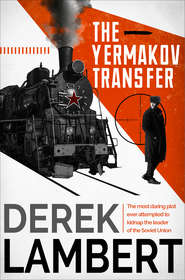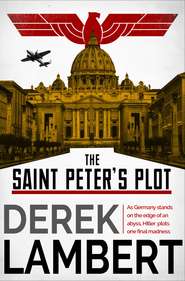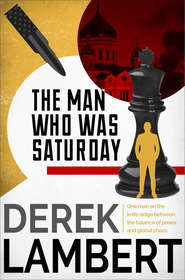По всем вопросам обращайтесь на: info@litportal.ru
(©) 2003-2024.
✖
The Red House
Автор
Год написания книги
2018
Настройки чтения
Размер шрифта
Высота строк
Поля
The meet was supposed to be in a bar on 14th, where pornography and bare flesh prospered alongside the palatial seats of national and world power. Very dark, probably, with a dirty movie grunting along in the background.
Tardovsky was heading in the right direction. But hadn’t anyone told him that Washington was the worst city in the States for getting mugged? And what the hell did he do if the Russian was jumped? On 14th anything could happen. On this sad street the orifice-filled bookshops and the girlie clip-joints were doing fair trade. A few bums, junkies and sharply-dressed blacks hung around the doorways. Jesus, Costello thought, right on the President’s doorstep.
Then he became aware that he was maybe not the only tail on Tardovsky. Behind the two of them he sensed another shadow. They were about to play games. But who the hell was the playmate?
Tardovsky entered the bar just off 14th and sat down at a table. On the screen a long way down the tunnel of the bar a couple stripped and simulated copulation; the girl showed her genitals with abandonment, her lover was more coy—maybe he was ashamed of them, Costello thought.
Tardovsky ordered a beer and took his hat off. Right, Costello thought—you should take off your hat in the presence of a lady. He sat way behind Tardovsky and glanced at his watch: five minutes till the meet. He ordered a Scotch from the girl in the crotch-high black skirt.
The second shadow sat down to the left of Costello, three tables away. Costello took a look at him. Very wet, like himself, very cold. Powerful looking, impossible to distinguish his features behind the turned-up collar of his bulky topcoat.
Why hadn’t they told him more? ‘Just keep your eye on them to make sure nothing goes wrong. Keep in touch.’ But they hadn’t mentioned a third party who could be Russian, American, British, Czech (they were pretty high in the espionage stakes these days). Three minutes to go.
Tardovsky, who looked bored with the repetitive sex looked at his watch and went to the toilet. The man in the bulky topcoat followed. Which means I have to follow too, Costello decided.
But the toilet wasn’t designed for espionage or the prevention thereof. With two big men bulging in the confined space behind him, Tardovsky didn’t bother to finish what he was doing at the stall. He zipped up, ducked between them with giraffe agility and was gone.
‘Shit,’ said Costello. He turned to follow.
‘Not so fast,’ said the other man, his face blond and fierce behind the collar.
‘Who the hell are you?’
‘Who the hell are you, buddy?’
‘It doesn’t matter now.’ Costello heaved towards the door.
‘Oh yes it does. Sure it does.’ The stranger chopped at Costello’s neck but hit his elbow on the wall. Costello got him in the stomach with two karate fingers; although the topcoat blunted the impact.
They fought savagely for a couple of minutes. But the toilet wasn’t designed for pugilism either. So they identified themselves and, while the faucet over the stall urinated noisily, silently contemplated their plight.
On the screen in the bar corner the young man indicated facially that orgasm was near while the girl sighed with what could have been ecstasy or frustration.
The personality of Wallace J. Walden was split down the middle on the subject of his capital city. He revelled in its dignified masonry, smooth lawns, stern statues, its libraries and museums and broad avenues, the stately homes of President and Government, the Washington Monument poised like a stone rocket set for launching. He loved to see tourists patrolling beneath Japanese cherry trees and expressing admiration at such a graceful seat of power. Sometimes he interrupted—‘I couldn’t help overhearing’—and put them straight on historic facts: Washington offered 500 dollars for a design for The Capitol and Dr William Thornton from Tortola in the West Indies won (‘Italian Renaissance, you understand’), the city was originally conceived by Pierre Charles l’Enfant, a protégé of Lafayette, as ‘a capital magnificent enough to grace a great nation’—‘And did you know that Washington who chose the site here in Maryland and Virginia was a surveyor himself? Few people seem to know that …’ Then he gave them the Visitors Information Service number (347–4554) before moving on to survey the Reflecting Pool, pillared palaces of bureaucracy, the spruce, beech and magnolia, with an awe and pride that had survived twenty-five years acquaintanceship.
The split occurred because Wallace J. Walden detested Washington’s principal industry—politics. Or, more particularly, he disliked intriguing politicians. Which was ironic because Walden’s own job was intrigue.
He admired ambition but abhorred its crude application; if there was one person he disliked more than a senator peddling a cause with votes in mind, rather than humanity, it was a senator’s wife pursuing the same objective over tea or Martinis. Jesus, he thought this glacial morning as he walked beside the whispering ice on the Tidal Basin, God save us from the women of Washington. (He was both a blasphemous and God-fearing man.) But, like it or not, Washington was a women’s city, every secretary trying to do a Jackie Kennedy. Only last night he had read in the Evening Star that the president of the Democratic Congressional Wives’ Forum was advising freshmen lawmakers to employ professional comedians to spike their speeches with gags. If they had their way, Walden ruminated without humour, Bob Hope would become president. Or Bill Cosby.
The wind blew eddies of snow across the ice separating Walden from Thomas Jefferson standing on pink Tennessee marble behind the white portico of his dome. ‘I have sworn upon the altar of God eternal hostility against every form of tyranny over the mind of man.’ So had Walden. He regretted that the means to his end involved intrigue, subterfuge and murder. But he had no doubts that the means justified the end.
He gulped down the iced air hungrily, felt the cold polish his cheeks. A lonely figure with heavy pipe gurgling, welted shoes marching firmly on the crusty ground, hat never too firm on the springs of his greying cropped hair.
Here every morning, after leaving his wife and enigmatic teenage children in Bethesda, Walden assembled his day. Today he was thankful for the ache in the air because, to an extent, it numbed his anger at the stupidity that had once again spoiled an inspired manoeuvre.
Tardovsky had been a prospective defector. One of the intellectuals who had smelled liberty, nibbled at abundant living, appreciated the ripe fruits of democracy. A patriot, sick of doctrinaire socialism, hesitating on the portals of freedom. Now he was lost for ever.
Walden had decided that Tardovsky was not the man to be courted with gifts, sleek-limbed girls on Delaware beaches, visits to perfect American homes with gentle and obvious persuasion over blueberry pie. So his honest, devious mind had considered other ploys. A doubter from the Soviet Embassy meeting a doubter from the State Department. Together they would renounce the duplicity of both great powers and seek refuge in some snowbound haven in Canada—where all the American trash found bolt-holes. But even if Tardovsky had ended up in Toronto or Montreal the defection would have occurred in the capital of the United States. A highly prestigious landmark on the road to The Final Solution: universal understanding of the Communist (and atheist) myth.
The F.B.I. had been pursuing the scheme energetically. A phoney State Department traitor had been established. Then apparently the C.I.A. had got wind of the stool-pigeon’s double-dealing and, never for one second allowing for the possibility of double, double-dealing, had arranged their own surveillance without confiding their plans.
Result: a fist fight in a men’s room in a dirty movie bar.
Thus, through the offices of bumbling incompetents, did tyranny survive. Thank God the K.G.B. was also served by incompetents who did everything by the book. If only I had the Mafia on my side …
Walden left the gaze of Jefferson, entered the spectrum of Lincoln and watched the children skating on the Reflecting Pool: it was their future he was fighting for. A jet rose heavily from the National Airport, keeping ominously low to restrict its noise, labouring over Lincoln’s Colorado marble shrine of freedom, justice, immortality, fraternity and charity. The qualities he had to preserve.
The grumbling line of traffic on Constitution Avenue opened at a red light and Walden crossed, heading for the State Department where he co-ordinated the various intelligence organizations behind a vague political title. That bum Costello! The heating in the lobby of this throbbing modern building, the laboratory of American influence, escalated his anger—a menacing, inexorable quantity not unlike the lurking hatreds of the intriguing Church dignitaries of history.
Walden summoned to his office that morning the heads of Security and Consular Affairs, Intelligence and Research, and Politico-Military Affairs. Also the deputy heads of the F.B.I. and the C.I.A.
‘Gentlemen,’ said Walden, handing around cigars, ‘a fiasco was perpetrated in our city last night. It is probably not necessary for me to say that, to an extent, we are all responsible.’
The ensuing silence did not imply unqualified agreement.
‘It is our joint responsibility, Goddammit!’ He picked up his pipe. ‘I’m sorry, gentlemen, but I’m disgusted at the way this operation has been handled.’
Jack Godwin from the C.I.A., a shifty egghead in Walden’s opinion, with an irritating habit of detaching morsels of tobacco from the tip of his tongue like a conjurer, ventured an opinion that, as the operation had been Walden’s brainchild, the failure was his responsibility. ‘Just like you would have accepted the plaudits if it’d been a success.’
Walden turned on him. ‘If you had kept me informed of your suspicions this foul-up would never have happened. Surely to Christ the C.I.A. is aware by now that its primary function is overseas intelligence?’
‘Sure we realize that,’ Godwin said. ‘But with practically every foreign country represented in Washington our job begins at home.’
‘You could co-ordinate with the Federal men. You could perhaps trust them to pass on to you any information they think you need.’
Godwin shrugged. ‘How do they know what we need?’
Arnold Hardin from the F.B.I. said, ‘It’s not outside our capabilities.’ A neat, late-middle-aged man, sarcastic and ingenious, as tidy as Godwin was unkempt.
The other three participants from the State Department kept their counsel. A secretary bearing coffee came into the aseptically chic office with its multiple telephones, maps of Moscow indicating the limits within which Americans could move, its photographs of the President, Vice-President and Secretary of State, its small battery of reference books which included The Bible.
The five of them stirred and sipped and waited.
Finally Gale Blair from Security and Consular Affairs said, ‘You shouldn’t take it so hard, Mr Walden. Think of all the successes.’ She was a smart, kindly woman.
They all thought hard.
Crawford from Politico-Military said, ‘The F.B.I. didn’t do too badly when they caught the Czechs trying to bug the office of Eastern European Affairs.’
‘Thank you,’ said Hardin, crossing elegant legs, flicking dust from a polished toecap. ‘But don’t forget to thank Frank Mrkua, the passport courier who made it possible by co-operating with us.’
‘And we should also be thankful to the F.B.I.,’ said Godwin, spilling coffee on his lived-in jacket, ‘for tapping the German Embassy and finding evidence of the Nazi-Soviet pact. In 1939,’ he added, timing it nicely.
Crawford, a diligent and enthusiastic man, said, ‘The F.B.I. also nailed Wennerstrom. They’ve got a whole bevy of defectors in the past couple of years. And what about this guy they caught making a drop under the railway bridge in Queens—he’s helped bust the Soviet network wide open. And the Soviets still think he’s working for them,’ Crawford supplied in case anyone present didn’t know.
‘Maybe he is,’ Godwin grunted.
Hardin sharpened his voice. ‘I sometimes wonder when they come to write the definitive history of the C.I.A. whether they’ll record the occasion when bugs were found inside the eagle the Soviets presented to the American Embassy in Moscow.’











